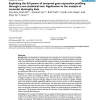Free Online Productivity Tools
i2Speak
i2Symbol
i2OCR
iTex2Img
iWeb2Print
iWeb2Shot
i2Type
iPdf2Split
iPdf2Merge
i2Bopomofo
i2Arabic
i2Style
i2Image
i2PDF
iLatex2Rtf
Sci2ools
131
click to vote
BMCBI
2006
2006
Exploiting the full power of temporal gene expression profiling through a new statistical test: Application to the analysis of m
Background: The identification of biologically interesting genes in a temporal expression profiling dataset is challenging and complicated by high levels of experimental noise. Most statistical methods used in the literature do not fully exploit the temporal ordering in the dataset and are not suited to the case where temporal profiles are measured for a number of different biological conditions. We present a statistical test that makes explicit use of the temporal order in the data by fitting polynomial functions to the temporal profile of each gene and for each biological condition. A Hotelling T2-statistic is derived to detect the genes for which the parameters of these polynomials are significantly different from each other. Results: We validate the temporal Hotelling T2-test on muscular gene expression data from four mouse strains which were profiled at different ages: dystrophin-, beta-sarcoglycan and gammasarcoglycan deficient mice, and wild-type mice. The first three are anima...
Related Content
| Added | 10 Dec 2010 |
| Updated | 10 Dec 2010 |
| Type | Journal |
| Year | 2006 |
| Where | BMCBI |
| Authors | Veronica Vinciotti, Xiaohui Liu, Rolf Turk, Emile J. de Meijer, Peter A. C. 't Hoen |
Comments (0)

